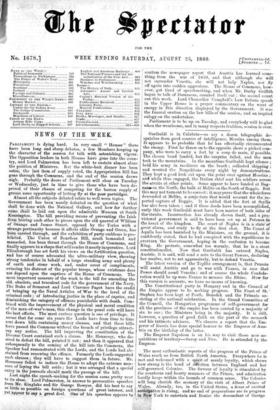NEWS OF THE WEEK.
PlatrAmEn is dying hard. In very small " Rouses " there have been long and sharp debates, a few Members keeping up the character of the session for talk with astonishing vigour. The Opposition leaders in both Houses have gone into the coun- try, a:nd Lord Palmerston has been left to sustain almost alone the position of Ministers. But the white-bait dinner has been "eaten' the last item of supply voted, the Appropriation Bill has gone through the-Commons, and the end of the session draws nigh. Probably the doors of Parliament will close on Tuesday. or Wednesday, just in time to give those who have been de- prived of their chance of competing for the barren supply of grouse some opportunity of letting fly at the pear partridges.
Almost all the subjects debated relate to well worn topics. The Government has been 'nearly defeated on the question of what shall be done with the National Gallery, and how far further sums shall be laid out upon the admirable Museum at South Kensington. The bill providing means of preventing the Irish from tearing each other to pieces upon the old quarrel of William of Orange and James Stuart, opposed by the Tories with a strange pertinacity because it affects alike Orange and Green, has been carried through, and the exhibition of party emblems is pro- hibited. The Union of Benefices Bill, much bemauled and manacled, has been thrust through the House of Commons, and finally appears in a shape that will render it nearly inoperative. Lord Ellenborough has set forth his views on the fortification question, ,and has of course advocated the ultra-military view, showing strong tendencies In behalf of a large standing army and plenty of earth and stone work, and, under cover of compliments, evincing his distrust of the popular troops, whose existence does not depend upon the caprices of the House of Commons. The most important measure of the week is the bill for amending the old, obsolete, and truculent code for the government of the Navy, The Duke of Somerset and Lord Clarence Paget have the credit of bringing up the Naval Articles of War to the level of the criminal code ; of introducing justice in the place of Caprice and diminishing the category of offences punishable with death.Com- bined with the improvement of the physical and moral condition of the man-of-war's-man; this change in the penal code will have the best effects. The most curious question is one of privilege. It seems that for some six years the Lords have from time to time sent down bills containing money clauses, and that these bills have passed the Commons without the breach of privilege attract- ing any notice. The bill improving the constitution of the Divorce Court contained such a clause. Mr. Hennessy, who de- sired to defeat the bill, pointed it out; and then it appeared that subsequently to the coming of the bill into the Commons, the Speaker had remonstrated with the Lords, and the Lords had ab- stained from renewing the offence. Formerly the Lords suggested such clauses ; they will have to suggest them in future. Mr. Hennessy failed to induce the Rouse to adopt the extreme mea- sure of laying the bill aside ; but it was arranged that a special entry in the journals should mark the passage of the bill.
Last night the speech-making for the session came pretty near to its close. Lord Palmerston, in answer to provocative speeches from Mr. Kinglake and Sir George Bowyer, did his best to say as little as possible on foreign questions of great interest, and yet appear to say a great deal. One of his speeches appears to
confirm the newspaper report that Austria has learned some- thing from the war of 1859, and that although she will not surrender Venetia, she will not help Naples, nor .fly off again into sudden aggresions. The House of Commons, how- ever, got tired of speechmaking, and when Mr. Darby Griffith began to talk of Damascus, counted itself out ; the second count out this week. Lord Chancellor Campbell's Law Reform speech in the Upper House is a proper commentary on the want of energy in this direction displayed by the Government. It was the funeral oration on the law bills of the session, and an implied eulogy on the undertaker.
Parliament is to be up on Tuesday, and everybody will be glad when the wearisome, and in many respects fruitless, session is over.


























